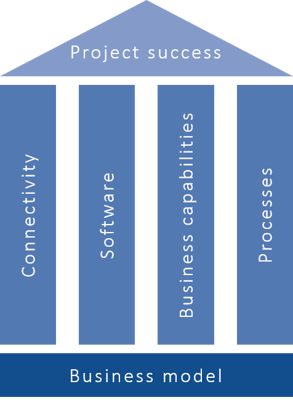The digitization of industry is advancing inexorably. Especially for companies from the discrete manufacturing industries (DMI), Industry 4.0, i.e. the intelligent networking of machines and processes in industry with the help of information and communication technology, is becoming an increasingly relevant success factor in order to remain competitive. Technologies such as the Internet of Things, artificial intelligence and big data analytics enable efficient and automated production - but only if they are used in a targeted manner. This requires a suitable use case, which is usually defined by a company's business model.
Support us in creating an up-to-date market picture on Industry 4.0
Questioning and adapting the business model
A business model describes how a company creates (added) value for its customers while operating profitably itself. In this context, it is important to take into account changing customer needs as well as technological progress. The introduction of Industry 4.0 technologies opens up new opportunities for companies to optimize their own value chain and increase customer satisfaction. Companies are therefore required to review their existing business models and, if necessary, make adjustments or establish completely new business models. In this way, they ensure that new technological possibilities, for example, are integrated in the best possible way.
What makes an Industry 4.0 project successful?
 Five aspects in particular are relevant for the successful implementation of an Industrie 4.0 project:
Five aspects in particular are relevant for the successful implementation of an Industrie 4.0 project:
-
the business model, which acts as the target picture and ensures that the project generates added business value. To ensure the success of the project, the business model must serve as the foundation on which the other parameters are built.
-
the connectivity of the machines to collect the operational data at the machine using sensors and transfer it to the cloud
-
the software to implement the requirements
-
the definition of the business capabilities that are already in place or are to be established
-
the adaptation and optimization of the associated processes
An important prerequisite for project success is that the entire project planning is based on the business model. This is because a clearly defined business model serves as orientation for the upcoming project by depicting the business added value. In addition, the business model helps to clarify the project goal with all stakeholders and ensure that each employee internalizes the goal and consistently works toward it.
In line with overall goals
When project planning is based on the business model, all project stakeholders can focus on the business objectives and align their activities to achieve those objectives. It ensures that the technical and operational aspects of the project are in line with the overall business objectives. Such an approach helps eliminate unnecessary steps and allocates resources more efficiently because of the shared focus on core business objectives.
The biggest risk with projects that are not aligned with the underlying business model: During the project, it turns out that the technology is used just for the sake of it and lacks clear alignment with business outcomes. The result is a huge waste of resources. Without a clear target picture, the project management also runs the risk of losing its way in the further course of the project and focusing on technologies or processes that do not add any value to the company.
Conclusion: Industry 4.0 needs a fixed framework
The scenarios outlined show why the business model is indispensable as a starting point for project planning in the Industry 4.0 environment. This is the only way to ensure that the technologies and process optimizations are aligned with the needs of the company and create added value. The business model should define the target group, the competitive advantages and the value contribution of the product or service. Based on this, a clear project framework can then be established that covers the development of technologies, processes and business models and focuses on creating concrete business value for the company. This helps to create a clear target picture and minimize risks.
![IBacademy_Logo_blau[496] IBacademy_Logo_blau[496]](https://www.ibsolution.com/hs-fs/hubfs/IBacademy_Logo_blau%5B496%5D.jpg?width=200&name=IBacademy_Logo_blau%5B496%5D.jpg)




